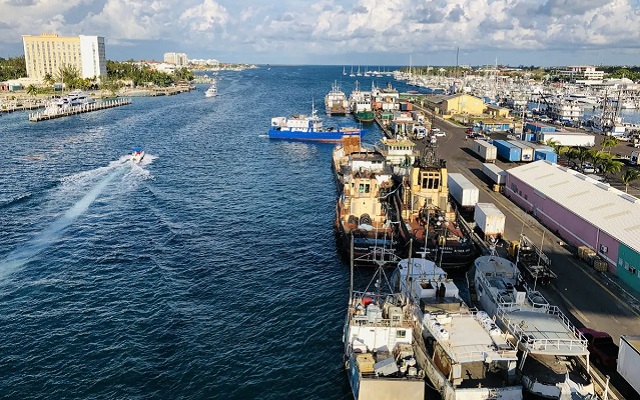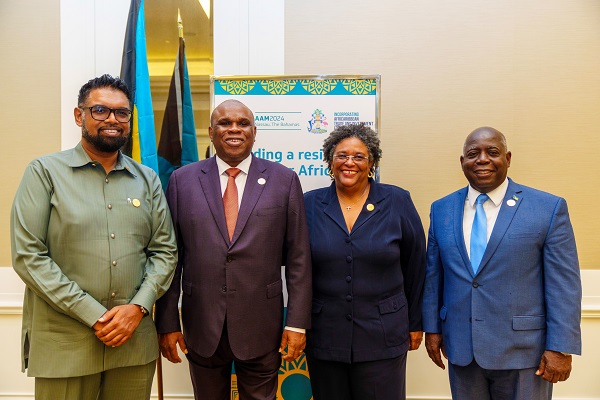
ITC statistics show that trade between Africa and the Caribbean is limited and concentrated in a few sectors, notably minerals and chemicals
ANALYSIS | ISAAC KHISA | African-Caribbean trade ties have remained largely unexplored for many years, despite a shared history and culture. Both regions have historically focused on solidifying relationships with larger global trade players, overlooking the potential for bilateral trade.
The absence of trade agreements between countries in these regions has resulted in insignificant trade volumes. According to the International Trade Centre (ITC), a joint agency of the World Trade Organization and the United Nations Conference on Trade and Development (UNCTAD), in 2020, less than 1% of Caribbean exports were destined for Africa, and only 0.08% of African exports went to the Caribbean. These limited bilateral exports are heavily concentrated in natural resources, chemicals, vessels, and some motor vehicles.
However, the situation is gradually changing, thanks to Afreximbank’s increased efforts to enhance cooperation backed by political will to capitalize on each other’s economic potential. Heads of state and government of the Caribbean and Africa have expressed their commitment to strengthening collaboration to foster trade and investment, as evidenced by the Caribbean Community (CARICOM).
Indeed, in December 2022, the Board of Directors of the African Export-Import Bank approved US$1.5 billion in funding to enable member states of the CARICOM that had ratified the Partnership Agreement with Afreximbank to tap into the Bank’s various financial instruments.
With the exemption of Trinidad and Tobago, Jamaica, Haiti and Montserrat, 11 out of the fifteen CARICOM member states have signed the Partnership Agreement with Afreximbank.
The financing supports critical economic sectors aimed at boosting trade-enabling infrastructure and enhancing trade and investments between Africa and CARICOM member states, while also providing support to small and medium enterprises. The bank has committed to increasing the credit limit to US$3 billion.
Speaking at the African Export-Import Bank (Afreximbank) Annual Meeting held in Nassau, The Bahamas, from June 12-25, 2024, the Afreximbank President and Chairman of Board of Directors, Prof. Benedict Oramah, emphasized the interconnected fate of all Africans, irrespective of their geographical locations, race, or color.
“The over two billion Africans spread around the world must now recognize that together, they constitute a powerful economic force that cannot be ignored; they must also recognize that power can only be potent and credible if they deliver on a common and cohesive platform,” he said, adding that the African Continental Free Trade Area offers huge market potential.
Bahamas Prime Minister Philip Davis echoed this sentiment, highlighting the need for Africa and the Caribbean to leverage their collective skills, resources, and shared mission. He stressed the importance of innovating and collaborating to create a future where both regions harness their economic power to dismantle barriers and build bridges.
Davis proposed coming up with a blueprint that includes key initiatives that will unite banking systems, enhance financial inclusivity, and catalyze economic growth across Africa and the Caribbean.
He also suggested establishing a Joint Financial Task Force to harness the expertise of banking and finance leaders, policymakers, and stakeholders from both regions. He also called for harmonizing regulatory frameworks to address hurdles in the journey towards financial integration.
Davis pointed out opportunities for collaboration in tourism, agriculture, renewable energy, and technology to boost trade volumes and values between the two regions.
ITC statistics show that trade between Africa and the Caribbean is limited and concentrated in a few sectors, notably minerals and chemicals. However, recent global economic crises, such as the COVID-19 pandemic and the war in Ukraine, have spurred political will to diversify trading partners and strengthen trade ties between the two historically linked regions.
The ITC estimates the export potential of trade between Africa and the Caribbean at $1.1 billion. Services exports to Africa hold significant opportunity for Caribbean countries, while Africa has 2.3 times more potential to export goods rather than services to the Caribbean, according to ITC.
Africa could boost its annual goods exports to the Caribbean by $171 million by 2026 – a 54% increase over 2020 export levels – if it addresses trade barriers and channels investments into merchandise sectors with growth potential. The Caribbean could lift exports of goods to Africa by $80 million, or 29%.
Tourisms is the big thing
Barbados Prime Minister Mia Mottley highlighted tourism as an untapped area for collaboration. She proposed that investors from the Caribbean and Africa work together to lease or charter cruise ships, focusing on the preferences of their people.
Mottley pointed out that African and Gulf states have the lowest penetration in global cruise tourism, while the Caribbean hosts cruise ships daily.

Besides tourism, CARICOM leaders emphasized the potential for growth and collaboration in agriculture, renewable energy, and technology.
Guyanese President Dr. Mohamed Irfaan Ali, current Chairman of CARICOM, said the region too has a huge potential in renewable energy, noting the high sunshine radiation and favorable wind intensity.
He made a specific pitch for renewable energy financing, envisioning the region as a major manufacturer of electric vehicles with minimal environmental impact.
Guyana itself has increased imports of electric vehicles, implementing policies to support eco-friendly transportation.
The country now has over 200 electric vehicles on its roads, with zero duty and tax rates for electric vehicles and an increased write-down allowance for businesses investing in eco-friendly cars.
The government has also set up publicly accessible EV charging stations and trained personnel to service EVs, demonstrating a gradual shift towards electro-mobility.
Dangote, Access Bank shows interest to invest in the CARICOM
In response, Nigerian entrepreneur Aliko Dangote said he could consider setting up a terminal in the Caribbean to export petroleum products to the CARICOM. The CEO of Dangote Group of Companies revealed that his oil refinery in Nigeria could easily supply petroleum products to the region within 18 to 20 days.
“I know the price in the Caribbean in terms of petroleum products is very high. We produce it cheaply. We can always bring it here. We can set up a terminal and we’ll be able to fix their needs,” he said. “Once we set up a terminal, they will have very cheap oil. They will have cheap energy. And by having cheap energy, their own economy will grow faster.”
Besides petroleum products, Dangote said his company has the capacity to meet the Caribbean cement demand, creating a win-win situation for both parties.
“We now have a capacity of almost 52 million tons of cement. By the end of next year, we will be at 62 million tons of cement capacity. We are not only saying that we can bring in from Nigeria or from Africa. If they have limestone, we can also produce what can satisfy them. We have done that before in Africa, and we should be able to free them from the shackles of other people. It will be a win-win between them and us.”
Similarly, Nigeria’s Access Holding Plc, the parent company of Access Bank, which recently acquired a majority stake in Finance Trust Bank, signaled plans to expand to Caribbean countries to deepen trade links between Africa and the Caribbean.
“We are exploring opportunities, which is why Access Bank has been actively participating in various trade and investment conferences facilitated by Afreximbank between Africa and the Caribbean,” Aigboje Aig-Imoukhuede told BusinessDay.
“When Access Bank comes to the Caribbean, it will bring the necessary digital services that the people here need to thrive,” he said during the plenary session on ‘Opportunities for Global Investment for Economic Growth and Diversification into the Caribbean’.
Aig-Imoukhuede said they are continuously improving their understanding of these markets and are dedicated to establishing strong relationships and partnerships with local stakeholders.
 The Independent Uganda: You get the Truth we Pay the Price
The Independent Uganda: You get the Truth we Pay the Price



